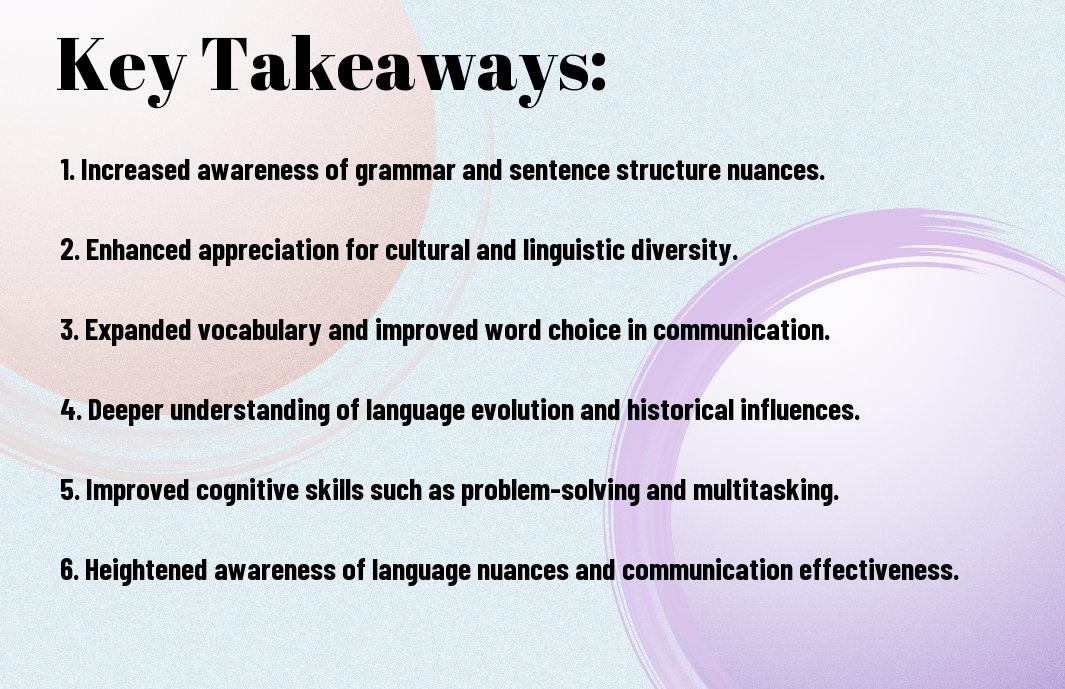Language holds the key to unlocking a deeper comprehension of the world around you. As you commence on the journey of learning a new language, you open the door to a new realm of linguistic exploration that can revolutionize how you perceive and grasp the intricacies of your native tongue. The process of acquiring a new language magnifies your awareness of grammar rules, sentence structures, and even cultural nuances present in your first language, shedding light on its complexities and enhancing your overall linguistic aptitude.
Key Takeaways:
- Improves linguistic awareness: Learning a new language can enhance one’s understanding of the structure and grammar of their native language.
- Expands vocabulary: The process of learning new words and expressions in a different language can lead to a deeper appreciation and utilization of vocabulary in one’s native language.
- Enhances communication skills: Mastering a new language can improve one’s ability to convey thoughts and ideas effectively in their native language as well, as it sharpens overall language skills.

The Interconnectedness of Language
Language as a Web of Associations
For you, language is not just a set of words and syntax rules. It is a complex web of associations, where each word carries with it a nuanced meaning shaped by cultural, historical, and personal experiences. When you commence on learning a new language, you start to unravel this intricate web, discovering how words interconnect and relate to one another.
How New Language Acquisition Affects Native Language Patterns
With each new language you learn, you not only expand your linguistic repertoire but also gain a fresh perspective on your native language. This new lens allows you to notice subtleties and nuances in your mother tongue that you might have previously overlooked. It can lead to a deeper appreciation of the beauty and complexity of language.
It is fascinating to observe how learning a new language can influence the way you use your native language. You may find yourself incorporating unique expressions or sentence structures from the new language into your speech or writing. This cross-pollination of languages can enrich your communication skills and make you a more versatile and adaptable communicator.

The Linguistic Lens
Perspective Shift: Seeing Native Language in a New Light
Now, as you commence on the journey of learning a new language, you will find that your perspective on your native language begins to shift. Suddenly, you become more aware of the grammar rules, pronunciation nuances, and even cultural connotations that were previously second nature to you. This newfound awareness allows you to view your native language through a different lens, appreciating its complexities and subtleties in ways you never did before.
Enhanced Metalinguistic Awareness
On your language learning journey, you will develop enhanced metalinguistic awareness, which is the ability to consciously think about and understand the rules and structures of language. This awareness not only helps you grasp the mechanics of the new language you are learning but also deepens your understanding of your native language. You start noticing patterns, making connections, and recognizing the intricacies of grammar and syntax that you might have previously taken for granted.
In light of this enhanced metalinguistic awareness, you begin to see your native language through a more analytical and critical lens. You appreciate the beauty of its construction, marvel at its flexibility, and understand its nuances in a way that enriches your overall linguistic competence.
Cognitive Benefits
Improved Memory and Attention
Not only does learning a new language expand your communication skills, but it also enhances your cognitive abilities. One of the key benefits is the improvement in memory and attention. When you learn a new language, your brain is constantly switching between languages, which requires you to actively pay attention to the nuances of each. This cognitive demand strengthens your attention span and ability to concentrate.
Enhanced Problem-Solving Abilities
Attention! Learning a new language can also lead to enhanced problem-solving abilities. As you navigate the complexities of a different linguistic system, your brain develops new neural pathways that are crucial for problem-solving and critical thinking. This mental agility can be transferred to various aspects of your life, enabling you to approach challenges with a fresh perspective and innovative solutions.
This cognitive flexibility gained from learning a new language can be immensely valuable in your personal and professional life. It allows you to adapt to new situations quickly, think creatively, and consider multiple perspectives when facing obstacles. Embracing the challenges of language acquisition can truly transform how you approach problem-solving in all areas of your life.

Cultural Insights
Unpacking Cultural Nuances in Native Language
For any language learner, delving into a new language provides a unique perspective on their native language’s cultural nuances. As you explore the intricacies of another language, you become more aware of how culture and language are intertwined. This deeper understanding can lead you to discover subtleties in your native language that you may have previously overlooked.
Broadening Cultural Perspectives through Language Learning
Insights gained from learning a new language not only enhance your understanding of your native language but also offer a gateway to broadening your cultural perspectives. By immersing yourself in another language’s structure, expressions, and idioms, you gain a deeper appreciation for different cultural norms and ways of thinking. This exposure can help you challenge your assumptions and develop a more inclusive mindset.
Cultural experiences gained through language learning go beyond mere vocabulary and grammar rules. They immerse you in a new way of seeing the world, promoting empathy, tolerance, and a deeper appreciation for diversity. Through this lens, you can navigate cross-cultural interactions with sensitivity and understanding, enriching both your personal and professional relationships.
The Role of Context
Many language learners find that delving into a new language can shed light on the nuances of their native tongue. As you commence on this linguistic journey, you may come to realize the profound impact of context on language comprehension and use. According to The Power of Mother Tongue: Its Impact on Language Learning and Understanding, understanding the role of context is crucial in grasping the intricate web of meanings embedded within a language.
How Context Shapes Language Meaning and Use
Context plays a pivotal role in shaping the meaning and usage of language. The way words are understood and interpreted can vary significantly depending on the surrounding context. When learning a new language, you become more attuned to the subtle shifts in meaning that arise from different contexts. This heightened awareness not only enhances your grasp of the new language but also deepens your appreciation for the intricate layers of meaning present in your native language.
The Impact of Context on Native Language Comprehension
Context not only influences how you interpret a new language but also how you comprehend your native tongue. Your understanding of familiar words and expressions can evolve as you become more cognizant of the contextual cues that shape their usage. For instance, you may start noticing the various connotations and shades of meaning that a single word can have based on the context in which it is used. This newfound awareness enriches your relationship with your native language, offering fresh insights into its subtleties and complexities.
The Dynamics of Language Transfer
Positive Transfer: When New Language Skills Enhance Native Language
Skills you acquire while learning a new language can often positively impact your understanding and proficiency in your native language. This phenomenon, known as positive transfer, occurs when the knowledge or skills gained in one language influence or enhance your abilities in another. For example, if you learn a new language that has a different grammatical structure than your native language, you may develop a deeper understanding of grammar concepts that could improve your communication skills in both languages.
Negative Transfer: Overcoming Interference from New Language
Skills you learn in a new language may also bring about challenges in your native language due to negative transfer, where interference from the new language affects your linguistic performance. This interference can manifest in various ways, such as using incorrect word order or pronunciation based on the rules of the new language. However, being aware of these potential challenges and actively working to overcome them can ultimately strengthen your language skills in both languages.
From recognizing common pitfalls to practicing specific exercises targeting areas of interference, overcoming negative transfer requires a proactive approach to language learning. By identifying areas where the new language may impede your native language abilities, you can focus on strategies to mitigate these challenges and enhance your overall linguistic proficiency.
Summing up
Following this exploration into how learning a new language impacts your understanding of your native language, it is clear that the process offers numerous benefits beyond just linguistic proficiency. By delving into a new language, you gain a deeper insight into the structure and nuances of your native language, enhancing your appreciation for its complexities and intricacies. Additionally, learning a new language encourages you to reflect on cultural differences and opens your mind to new ways of expression, ultimately broadening your worldview and fostering a deeper connection to your own language and culture.
Q: How does learning a new language impact one’s understanding of their native language?
A: Learning a new language can enhance one’s understanding of their native language by increasing awareness of grammar rules, vocabulary usage, and sentence structure. It forces individuals to think more critically about language and how it is used, leading to a deeper appreciation and understanding of their native language.
Q: Can learning a new language improve communication skills in one’s native language?
A: Yes, learning a new language can improve communication skills in one’s native language. By learning how another language functions and the nuances of communication in that language, individuals can apply similar concepts to their native language, resulting in improved speaking, writing, and listening abilities.
Q: Does learning a new language help individuals understand different cultural perspectives in their native language?
A: Absolutely, learning a new language exposes individuals to different cultural perspectives, customs, and traditions. This exposure can lead to a greater understanding and appreciation of diversity, which can then be applied to gain new insights and interpretations of one’s native language and culture.
